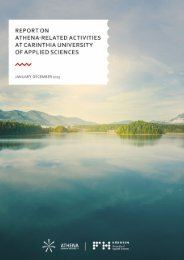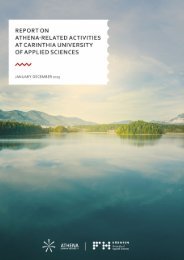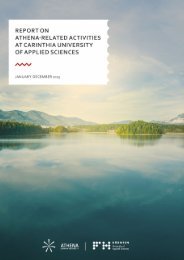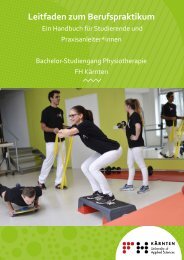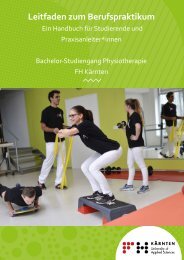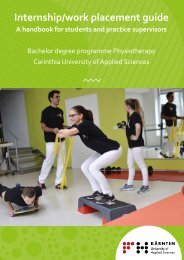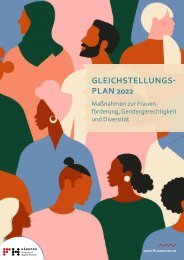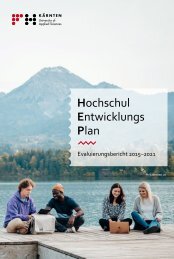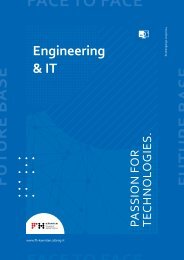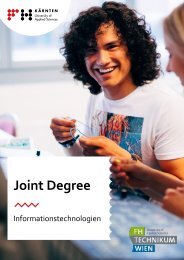Matilde Booklet
You also want an ePaper? Increase the reach of your titles
YUMPU automatically turns print PDFs into web optimized ePapers that Google loves.
ENHANCING MIGRANTS’ SOCIAL AND ECONOMIC<br />
INCLUSION AND LOCAL DEVELOPMENT IN<br />
EUROPEAN RURAL AND MOUNTAIN AREAS<br />
<strong>Booklet</strong> with MATILDE policy recommendations<br />
1
CALL: H2020-SC6-MIGRATION-2019<br />
Work Programmes:<br />
H2020-EU.3.6.1.1. The mechanisms to promote smart, sustainable and inclusive growth<br />
H2020-EU.3.6.1.2. Trusted organisations, practices, services and policies that are necessary to build resilient, inclusive, participatory,<br />
open and creative societies in Europe, in particular taking into account migration, integration and demographic<br />
change<br />
Deliverable 7.13 - <strong>Booklet</strong> with MATILDE policy recommendations<br />
Editors: Marika Gruber, Jessica Pöcher, Kathrin Zupan<br />
Cover photograph: Lavonne Bosman<br />
Layout and graphic editing: Anna Maria Orasch<br />
Approved by Work Package Manager of WP7: Ayhan Kaya, BILGI (31 August 2022); Anna Krasteva, NBU (31 August 2022)<br />
Approved by Project Coordinator: Jussi Laine, UEF (31 August 2022)<br />
DOI: 10.5281/zenodo.7021666<br />
Version: 31.08.2022<br />
This document was produced under the terms and conditions of Grant Agreement No. 870831 for the European<br />
Commission. It does not necessary reflect the view of the European Union and in no way anticipates the Commission’s<br />
future policy in this area.<br />
2
Introduction 4<br />
1. Austria 6<br />
Main Problems<br />
Policy Recommendations<br />
2. Bulgaria 15<br />
Main Problems<br />
Policy Recommendations<br />
3. Finland 24<br />
Main Problems<br />
Policy Recommendations<br />
4. Germany 32<br />
Main Problems<br />
Policy Recommendations<br />
5. Italy 42<br />
Main Problems<br />
Policy Recommendations<br />
6. Norway 50<br />
Main Problems<br />
Policy Recommendations<br />
7. Spain 58<br />
Main Problems<br />
Policy Recommendations<br />
8. Sweden 66<br />
Main Problems<br />
Policy Recommendations<br />
9. Turkey 74<br />
Main Problems<br />
Policy Recommendations<br />
10. United Kingdom 80<br />
Main Problems<br />
Policy Recommendations<br />
Summary 86<br />
CONTENT<br />
Appendix 103<br />
3
INTRODUCTION<br />
Many rural and mountainous areas face different challenges<br />
such as demographic change and ageing processes,<br />
population decline e.g. due to out-migration of young people<br />
or low birth rates as well as different framework conditions,<br />
which contribute to labour shortages and by doing so<br />
risks of supply insecurity and bottlenecks.<br />
MATILDE assumes that international immigration can be a<br />
way to counteract these negative trends in rural areas and<br />
be an opportunity for rural development and progress. Therefore,<br />
MATILDE focuses on the various impacts of international<br />
migration in rural and mountainous areas and how<br />
social and economic inclusion of international migrants,<br />
especially third-country nationals (TCNs), and rural development<br />
can be strengthened.<br />
The MATILDE booklet is a collection of the most essential<br />
problems as well as policy recommendations regarding<br />
social and economic migration identified in the 10 partner<br />
countries.<br />
The identification of key policy issues and the elaboration<br />
of corresponding policy recommendations are based on<br />
an ongoing analytical process in the MATILDE project. This<br />
involved a mixed-methods approach using qualitative interviews,<br />
focus groups, quantitative analysis of statistics as<br />
well as participatory action research in 13 case study regions<br />
with different focal points and involving key stakeholders<br />
from different government levels and fields of action.<br />
In particular for the development of policy recommendations,<br />
local, regional and national stakeholders were involved<br />
in so-called “policy roundtables”. There, based on the<br />
aforementioned research and building on a SWOT-analysis<br />
(strengths, weaknesses, chances and threats) for the different<br />
government levels, pre-validated policy problems, recommendations<br />
and solutions were presented, discussed,<br />
validated and further developed based on the focus of the<br />
respective MATILDE case study region. Hence, a feedback<br />
loop of preliminary results with stakeholders and people<br />
directly involved in the research still took place during the<br />
ongoing project. The co-designing of policy recommendations<br />
with relevant stakeholders should also promote subsequent<br />
consideration in further policy processes.<br />
The policy recommendations consider the interrelation of<br />
different policy fields beyond “integration” policies as well<br />
as the migration-rural development nexus. They are promoting<br />
measures and governance processes capable to<br />
better connect urban and rural/mountainous areas as well<br />
as fostering both, rural development and socio-economic<br />
inclusion of TCNs. The policy recommendations take into<br />
account three dimensions: 1) the different areas of integration<br />
(horizontal perspective), 2) the different political levels<br />
(vertical perspective; local/regional/national/European),<br />
and 3) different groups of TCNs (such as asylum seekers<br />
and refugees, migrant workers, persons settling down due<br />
4
to family reunion etc.). In total, the policy recommendations<br />
developed consider ten different „areas of integration“<br />
and have also been assigned to the corresponding level of<br />
government. The specific „areas of integration“ are marked<br />
with a corresponding symbol in this booklet (see also the<br />
explanation of the symbols in the appendix).<br />
Not every country covers policy recommendations for all<br />
levels of government. Apart from different focal points of<br />
the case study regions that influenced the core topics of<br />
policy recommendations, not all levels of government apply<br />
to all countries, such as the EU level for Norway or the<br />
United Kingdom.<br />
For the MATILDE booklet, the main problems and policy<br />
recommendations of the ten partner countries were reviewed<br />
and broken down to the most essential ones and collected<br />
in a concise form. They are intended to serve as an<br />
overview of the situations in the different partner countries<br />
and regions. The policy problems and recommendations of<br />
each MATILDE country/region listed in this booklet refer to<br />
the time of elaboration and validation. When certain topics<br />
are mentioned in the policy recommendations, it does not<br />
mean that there are no political measures and approaches<br />
in this context at all, but that further effort is recommended<br />
here.<br />
The booklet consists of chapters divided by countires, each<br />
emphasizing the main problems and policy recommendations<br />
as well as highlighting a selected policy recommendation<br />
that was considered particularly important to that<br />
country/region. The concluding chapter presents a summarising<br />
collection which offers a cross-country perspective of<br />
policy recommendations for the different areas of integration<br />
at a glance.<br />
Some of the policy recommendations formulated are not<br />
feasible within the current legal frameworks. However, this<br />
circumstance was not the claim, but should encourage to<br />
reconsider the given framework conditions and, in the best<br />
case, to change them in order to enable a positive development.<br />
Authors: Marika Gruber and Jessica Pöcher<br />
INTRODUCTION<br />
5
AUSTRIA<br />
Vorarlberg<br />
Carinthia<br />
6<br />
Authors: Marika Gruber, Jessica Pöcher and Kathrin Zupan
Main Problems<br />
Area of integration<br />
Lack of afternoon child care, full-day kindergarten places as<br />
well as resources for kindergartens in rural areas<br />
Lack of recognition of qualifications as well as long recognition<br />
processes<br />
Lack of (low threshold) encounter of local population and migrants<br />
to support the language acquisition and social inclusion<br />
Difficulties in finding qualified employees<br />
Labour shortage and de facto no apprenticeship and employment<br />
opportunities for asylum seekers due to legal restrictions<br />
Limited affordability of and discrimination at the private housing<br />
market<br />
Lack of public transport (as TCNs often do not have a driving<br />
license) and hence lack of accessibility of public services<br />
Limited availability and accessibility of language courses in<br />
rural and peripheral municipalities<br />
MAIN PROBLEMS<br />
Lack of cooperation between policy makers, stakeholders,<br />
NGOs and volunteers<br />
7
Local Level<br />
Policy Recommendation Short Explanation Area of integration<br />
Expansion of integration offices<br />
through a migrant intermediary<br />
Local institutions should expand their integration office to<br />
include the positions of „intermediary“ with a migrant background,<br />
who acts between the institution and the migrant<br />
community.<br />
POLICY RECOMMENDATIONS<br />
8<br />
Formation and support of already<br />
available communal offers<br />
Creating meeting spaces<br />
Communal offers such as open youth work, various learning<br />
cafés or sewing workshops provide low-threshold group offers<br />
and could serve as meeting places for TCNs and locals. Municipal<br />
offers do not exclusively refer to full-time work, but can<br />
be coordinated and supported by an municipal employee and<br />
operated by actively engaged volunteers.<br />
Opportunities for joint activities are needed to break down<br />
reservations and create a new awareness. It is important that<br />
such „spaces“ are made available at the local level, at affordable<br />
rents (or even free of charge) and without compulsion to consume,<br />
but with a low-threshold approach to reach all population<br />
groups.<br />
Local & Regional Level<br />
Policy Recommendation Short Explanation Area of integration<br />
Legislative reform and expansion<br />
of childcare services<br />
This policy recommendation aims to promote the adjustment<br />
of the childcare ratio (smaller group sizes) and the expansion of<br />
kindergarten places (especially in rural communities). Furthermore,<br />
the training of pedagogical staff should be increasingly<br />
oriented towards diversity, interculturality and multilingualism.
Regional Level<br />
Policy Recommendation Short Explanation Area of integration<br />
Strengthening the network<br />
between political representatives<br />
and stakeholders at all levels of<br />
governance<br />
Intercultural training for public<br />
administration staff<br />
Development of a information<br />
package on housing, social<br />
assistance and the labour market<br />
Expansion of public transport in<br />
rural and urban areas<br />
In Carinthia, is recommended to organise and conduct regular<br />
exchange meetings (e.g., roundtables in asylum issues) between representatives<br />
of the province of Carinthia, the federal government,<br />
municipalities, NGOs, civil society and migrant communities on a<br />
regular basis. The aim is to strengthen the multi-level governance<br />
of integration in the province of Carinthia. In Vorarlberg, the networking<br />
aspect emphasised the continuity of refugee coordinators<br />
at the regional level, who serve as contact persons and links for municipalities,<br />
volunteers and associations to ensure that central tasks<br />
of this function (awareness raising, exchange, counselling, etc.) can<br />
also be provided sustainably in small municipalities.<br />
Local politicians and employees in public administrations need<br />
intercultural trainings (e.g. through the Academy of Administration)<br />
for a strengthened sensitivity towards diversity, intersectionality<br />
and different social target groups.<br />
Persons granted asylum and subsidiary protection should receive<br />
this information before they leave basic care and asylum accomodation.<br />
This information should also be provided in different or<br />
relevant languages.<br />
Public transport as well as cycle paths should be expanded and<br />
financially supported in order to facilitate mobility and thus participation<br />
in social life and counteract segregation.<br />
POLICY RECOMMENDATIONS<br />
Establishing accommodation in<br />
central locations with good accessibiity<br />
Well-connected asylum accommodation facilitates with professional<br />
care and support, reachable via public transport to facilitate also<br />
inclusion in local community life.<br />
9
National Level<br />
Policy Recommendation Short Explanation Area of integration<br />
POLICY RECOMMENDATIONS<br />
Faster recognition of<br />
qualifications and specific<br />
education and training offers<br />
through further developed<br />
institution for holistic recognition<br />
of qualifications<br />
Sustainable reform of the asylum<br />
law<br />
Through these measures, potentials for the labour market<br />
can be used or promoted more quickly and could also have<br />
a positive impact on the integration and economic independence<br />
of migrants as well as the satisfaction of regional and<br />
local labour market needs. In order to ensure rapid recognition<br />
of TCNs‘ qualifications, a competent institution is needed that<br />
saves time and costs and minimises bureaucracy and, based<br />
on this, develops and offers specific educational programmes<br />
for migrants. Based on an already existing institution such as<br />
in Vorarlberg, it is recommended to develop such an institution<br />
with an extended focus on formal, informal and non-formal<br />
qualifications throughout Austria.<br />
Constant amendments to the law should be avoided, as these<br />
make the work of civil servants more difficult. Sustainable<br />
changes should also include specification concerning the<br />
acceleration of the asylum procedures and especially the<br />
appeal procedures as well as improving labour market access<br />
for asylum seekers, as they can currently only be employed<br />
with great bureaucratic effort. (Fast) economic integration<br />
would be important, both for their integration process, and to<br />
counteract the shortage of labour.<br />
10
National Level<br />
Policy Recommendation Short Explanation Area of integration<br />
More trained staff for asylum<br />
quarters<br />
The challenges and staff shortages have been exacerbated by<br />
the COVID-19 crisis. The ratio of caregivers to asylum seekers in<br />
shelters needs to be adjusted to ensure adequate quality.<br />
Better working conditions for<br />
caregivers in asylum shelters<br />
Extending mandatory<br />
kindergarten from one to two<br />
years<br />
Working conditions for staff and quality management need to<br />
be improved by providing (more) supervision and introducing<br />
minimum standards for qualifications and regular training. This<br />
would bring the quality of support in line with the Council of<br />
Europe recommendations.<br />
A two-year compulsory kindergarten would help children, especially<br />
newly immigrated children, children at risk of poverty etc.,<br />
to prepare adequately for school, promote their social integration<br />
and improve their language skills.<br />
POLICY RECOMMENDATIONS<br />
11
EU Level<br />
Policy Recommendation Short Explanation Area of integration<br />
POLICY RECOMMENDATIONS<br />
Introduction of a quota system<br />
Transparency in the distribution<br />
of asylum seekers<br />
Improving the quality of EU<br />
refugee management<br />
Focus on enhanced opportunities<br />
for migrants and newcomers in<br />
remote regions<br />
Due to the Dublin Regulation, some Member States are confronted<br />
with a high number of asylum seekers at the external<br />
borders compared to other Member States without bordering<br />
third countries. The quota system is intended to counteract<br />
congestion and inequality among the Member States at the external<br />
borders (e.g., a compulsory quota up to 1.5% of the total<br />
population; penalty fees in case of non-compliance).<br />
The distribution should be made transparent, e.g. with a<br />
transparency barometer. This would relieve the Member States<br />
at the external borders and achieve a fair distribution with an<br />
equal use of financial resources.<br />
This requires EU wide standards for admission and accommodation<br />
of asylum seekers. In addition, a monitoring system<br />
must be developed to assess asylum procedures, the quality<br />
of asylum accommodation and care, as well as sanctions if<br />
Member States continue to violate EU regulations.<br />
Instead of passive observation of „newcomers“ and reluctance<br />
to accept them, an open attitude and a focus on the positive<br />
aspects and potential of migration, especially for rural regions,<br />
should be given priority and migrants should therefore also be<br />
given opportunities to integrate successfully.<br />
12
13<br />
© Danja Santner
© Michael Stabentheiner<br />
AUSTRIA<br />
14<br />
© Marika Gruber<br />
Pictures from the case study regions Carinthia and Vorarlberg<br />
© Danja Santner
© Marika Gruber © BAB<br />
© BAB<br />
Strengthening the network between<br />
political representatives and stakeholders<br />
at all levels of governance<br />
© Danja Santner<br />
AUSTRIA<br />
15
BULGARIA<br />
Haskovo<br />
16<br />
Authors: Chaya Koleva, Anna Krasteva and Vanina Ninova
Main Problems<br />
Area of integration<br />
Lack of public support for social connections and communication<br />
between TCNs and locals<br />
Lack of public transport (regular, inter-village)<br />
Problematic monolingualism (Bulgaria) in public administrative<br />
procedures and on official websites<br />
Cultural practices are not promoted in several languages<br />
Lack of Bulgarian language skills due to lack of trainings<br />
Lack of enough Bulgarian language courses oriented towards<br />
migrants in schools<br />
Lack of support for social enterprises<br />
Anti-migrant rhetoric of far-right parties<br />
MAIN PROBLEMS<br />
17
Local & Regional Level<br />
Policy Recommendation Short Explanation Area of integration<br />
Support of migrants in social and<br />
volunteering engagements<br />
Many TCNs are socially engaged and oriented to help refugees<br />
or to contribute to local development. To support individual<br />
initiatives, the municipalities should support them logistically<br />
and financially.<br />
POLICY RECOMMENDATIONS<br />
Publish in Bulgarian and English<br />
on official websites<br />
Improve the transport network<br />
All basic administrative documents<br />
to be accessible in English<br />
Provide additional Bulgarian<br />
language programs<br />
Local events related to art, music, sport and ecology should be<br />
promoted on a schedule on the official municipal websites and<br />
published in Bulgarian and English language. Information, how<br />
to participate or volunteer, should be added.<br />
The public transport network needs to be improved with more<br />
regular inter-village bus lines, in order to make commuting<br />
easier and to increase the access to the regional center.<br />
There is a need to provide all basic adminsitrative documents<br />
in English (e.g. for the renewal of residence permits) to facilitate<br />
the understanding of TCNs who want to stay in the region.<br />
Several institutions (e.g. State Agency for Employment, Regional<br />
Directorate of Education, municipalities and business sector)<br />
should collaborate for providing free courses in Bulgarian<br />
language for adults and in schools for children, also after one<br />
year of language learning, in order to improve the integration<br />
processes of TCNs.<br />
18<br />
Establish institutional cooperation<br />
of active migrants<br />
Several TCNs are already promoting the regions as tourist<br />
destination and as a place for immigration, which should be<br />
supported by the municipalities. Additionally, they should be<br />
involved in strategy groups for tourism and migration.
National Level<br />
Policy Recommendation Short Explanation Area of integration<br />
Develop a strategy to attract<br />
foreign workers<br />
Due to the need of seasonal workers, the State Agency of<br />
Employment, the municipalities and the regional businesses<br />
should elaborate mechanisms to integrate TCNs in short-term<br />
jobs and to offer them vocational trainings depending on the<br />
regional economic‘s needs.<br />
Create and maintain sustainable<br />
cooperation to regularly train<br />
educators and psychologists<br />
Improve the infrastructure of the<br />
refugee camps (for children)<br />
A strategy of trainings for school staff should be created to<br />
meet the needs of TCNs (children) with traumas and in the<br />
need of psychosocial support to improve their development. So<br />
they should learn about practices in education, mental health<br />
and psychosocial support.<br />
The playground in the refugee reception camp needs to be<br />
renovated, for what the State Agency for Refugees should<br />
allocate funding to create a functional space for art and cultural<br />
activities for children.<br />
POLICY RECOMMENDATIONS<br />
19
EU Level<br />
Policy Recommendation Short Explanation Area of integration<br />
Promotion of successful selfemployed<br />
TCNs and refugees<br />
TCNs and refugees should be supported in setting business<br />
plans, applying for funding and with coaching seminars to<br />
develop start-ups. They should be invited to European coaching<br />
seminars, business forums, job fairs, and intercultural workshops<br />
to share their good practices to empower TCNs and<br />
refugees business successes contributing to rural development.<br />
POLICY RECOMMENDATIONS<br />
Additional training in Bulgarian<br />
for migrant children in schools<br />
Requirements and criteria for Bulgarian language in schools<br />
should be established to increase the number of trainings<br />
hours, to provide sufficient lecturers and to train the trainers in<br />
didactics.<br />
20
21<br />
© Paolo Libertini
© Vanina Ninova<br />
BULGARIA<br />
22<br />
Pictures from the case study region Haskovo<br />
© Vanina Ninova © Vanina Ninova
© Rumen Ninov<br />
© Rumen Ninov<br />
Promotion of successful selfemployed<br />
TCNs and refugees<br />
© Vanina Ninova<br />
BULGARIA<br />
23
FINLAND<br />
Ostrobothnia<br />
North Karelia<br />
24<br />
Authors: Lauri Havukainen, Pirjo Pöllänen and Daniel Rauhut
Main Problems<br />
Area of integration<br />
High demands on language skills in the Finnish labour market<br />
Current integration legislation neglects, for example, migrant<br />
workers and older people in the integration services<br />
Lack of on-the-job learning positions and resources to help the<br />
immigrants find those opportunities in small and rural<br />
municipalities<br />
Ineffective cooperation between the public sector and the third<br />
sector and the instability brought by project-based funding<br />
MAIN PROBLEMS<br />
© Giulio Bracalente<br />
25
Local Level<br />
Policy Recommendation Short Explanation Area of integration<br />
POLICY RECOMMENDATIONS<br />
Efficient organisation and<br />
cooperation in integration work<br />
Promoting the use of the local<br />
language in multicultural<br />
associations<br />
Promoting the local language as<br />
a language of integration<br />
There is a need for more coherent coordination of integration<br />
activities between the different actors, clear roles for municipalities<br />
and third sector actors, and adequate coordination<br />
between the different organisations working for the integration<br />
of immigrants, as well as a better contractual framework for<br />
employees working in project-based third sector employment.<br />
In order to create good relations with the population and<br />
mutual understanding, the importance of a common language<br />
is crucial. Although it may be impractical at first, using the<br />
local language will help immigrants from different language<br />
backgrounds to communicate better in the long run, but it will<br />
also improve relationship building with local stakeholders and<br />
encourage local people to participate.<br />
As many refugees are also settled in Swedish-speaking areas<br />
of the country, Swedish language should be promoted as the<br />
language of integration in these areas. Despite the awareness<br />
that this is a sensitive political issue, we believe that Swedish<br />
should have equal status as a language of integration so as<br />
not to compromise the immigrants‘ ability to integrate into the<br />
local community.<br />
26
Regional Level<br />
Policy Recommendation Short Explanation Area of integration<br />
More coherent coordination and<br />
cooperation between actors at<br />
regional level<br />
The local multicultural associations as well as NGOs should<br />
have a more organised regional cooperation in which they<br />
share information and best practices. In particular, applying<br />
for funding would be more effective if these local actors could<br />
form larger consortia at regional level.<br />
Consideration of the housing<br />
situation and distance when<br />
settling refugees<br />
Diversification of the economic<br />
structure to rural regions<br />
Improving the marketing of<br />
regions‘ strengths, opportunities<br />
and needs<br />
Many rural areas lack adequate housing and public transport,<br />
which can pose problems for the integration of refugees and<br />
asylum seekers in more remote areas. When settling, the focus<br />
should be on ensuring that they, especially families with children,<br />
are not accommodated in areas that are far from utilities<br />
and where a car is not needed to cope with everyday life.<br />
The labour requirements of companies must be weighed<br />
against the economic benefits, because the use of cheap immigrant<br />
labour will delay economic structural change, but not<br />
end it. Diversification of the economic structure is needed, as<br />
immigrants can play a crucial role. More resources should be<br />
made available to improve immigrants‘ language and academic<br />
performance in order to give them the opportunity to improve<br />
their socio-economic status.<br />
North Karelia and Ostrobothnia have a lot to offer for immigrants<br />
but are little known internationally, leading to challenges<br />
in attracting migrant workers. The regions must do more<br />
and better location marketing and location branding.<br />
POLICY RECOMMENDATIONS<br />
27
National Level<br />
Policy Recommendation Short Explanation Area of integration<br />
POLICY RECOMMENDATIONS<br />
28<br />
Involving the public sector in<br />
setting up on-the-job learning for<br />
immigrants<br />
National policy and support for<br />
groups that are left out of<br />
integration programs<br />
More stability for the work of the<br />
integration course organisers<br />
More clarity about responsibilities,<br />
rights and expectations in the<br />
integration process<br />
The new curriculum for integration education puts more<br />
emphasis on-the-job learning in language teaching. However,<br />
this is a demanding task for rural areas, since there are often<br />
not enough training places available on the private labour<br />
market. The public sector could do more to offer such apprenticeships<br />
to immigrants. This should be mandated at national<br />
level and it should be an obligation for local authorities.<br />
There should be national guidelines and economic support<br />
for local actors on how to substitute the language learning of<br />
those migrants who are not involved in the integration courses<br />
(e.g., the elderly and labour immigrants) as language learning is<br />
often essential for a successful integration.<br />
The organisers of the integration courses are in a conflicted<br />
situation due to their integration education program framework<br />
contracts (re-tendering every 4 years). They are expected<br />
to develop their language teaching, but at the same time they<br />
are under pressure to organise the courses cheaply. Organizations<br />
need continuity to develop teaching, an extension of the<br />
time until the next call for applications and a greater emphasis<br />
on qualitative factors such as experience in the application<br />
process.<br />
It would be beneficial for all stakeholders involved if the kind<br />
of aid, how much and for how long the society is providing it,<br />
would be communicated better. At the same time, it should<br />
also be clarified what is expected of the new residents. If all<br />
actors involved know what is expected of them, the outcome,<br />
output and impact of the process would improve.
EU Level<br />
Policy Recommendation Short Explanation Area of integration<br />
Better clarity and accessibility of<br />
EU-based funding opportunities<br />
The EU funding instruments for local and regional actors, NGOs<br />
should be more accessible and there should be better continuity<br />
for project-based activities. At the European level, thought<br />
should be given to how small but efficient NGOs could create<br />
activities that offer the possibility of more stable and permanent<br />
funding.<br />
POLICY RECOMMENDATIONS<br />
© Paolo Libertini<br />
29
© UEF<br />
© Samu Aarnio<br />
FINLAND<br />
30<br />
© UEF<br />
Pictures from the case study regions Ostrobothnia and North Karelia
© Jomoni<br />
Efficient organisation and<br />
cooperation in integration work.<br />
© UEF © UEF<br />
FINLAND<br />
31
GERMANY<br />
32<br />
Authors: Tobias Weidinger, David Spenger and Stefan Kordel<br />
Free State of Bavaria
Main Problems<br />
Area of integration<br />
Disharmonised and inconsistent policies and outcomes<br />
Lacking knowledge and insufficient communication and<br />
bureaucracy for employers<br />
Negative attitudes, exploitation, racism and discrimination at<br />
the workplace<br />
Lack of affordable and sizable housing lead to concentration<br />
processes of TCNs<br />
Lack of social housing<br />
Lacking availability of places in nurseries and kindergartens<br />
Lack of contacts, spaces and time for interactions to reduce<br />
cultural barriers<br />
Negative attitudes towards TCNs and situational<br />
hierarchisation of TCNs<br />
Long travel times despite short distances, high costs and<br />
complex ticket systems<br />
Long decision-making processes for the issuing of visas and<br />
the recognition of foreign credentials<br />
MAIN PROBLEMS<br />
33
All Level<br />
Policy Recommendation Short Explanation Area of integration<br />
Transparent and clear responsibilities<br />
for migration and integration<br />
policies<br />
The implementation of policies depends on a clear and transparent<br />
share of competences and responsibilities among<br />
all government levels. The migration and integration policy<br />
implementation should be mandatory with continuous funding<br />
and professionalisation processes.<br />
POLICY RECOMMENDATIONS<br />
34<br />
Offer a goal orientation<br />
Instead of a focus on one specific migrant target group, offers<br />
should address all immigrants and following, orient on the goal<br />
to include several groups of people.<br />
Local Level<br />
Policy Recommendation Short Explanation Area of integration<br />
Engage employers responsibility<br />
for international workforce<br />
Increase childcare and nurseries<br />
For the recruitment of international employees it is recommended<br />
to use networks of existing staff and of counsellors<br />
and target-group specific communication, to recruit multiple<br />
persons from the same country and to establish a relocation<br />
management. For the onboarding and retention of international<br />
employees, regular meetings, tandems or mentoring programs<br />
as well as work-accompanying language courses are recommended.<br />
Additionally, incentives, e.g. financially, with flexible<br />
work models or for long holidays to visit the family, could be<br />
beneficial.<br />
Child care is of high importance for the social integration of<br />
the children, but additionally a prerequisite for many mothers<br />
and single parents to participate in language and integration<br />
courses. There is a need for the construction of nurseries and<br />
kindergartens and the safeguarding of places in all-day child<br />
care and schooling infrastructures.
Foster contacts of migrants and<br />
local population<br />
Access to an increased connection is possible in nurseries,<br />
kindergartens, schools, workplaces, residential environments,<br />
events and festivities accompanied by mediators and bridgebuilders.<br />
Municipalities should held welcoming receptions for<br />
TCNs and parties for their naturalisation and establish<br />
welcome hubs. Additionally, clubs and associations could<br />
promote themselves in language and integration courses or<br />
schools to attract TCNs interest.<br />
Intercultural opening of public<br />
administration and services and<br />
education and economic players<br />
Strength regional networks and<br />
cooperation<br />
TCNs can be targeted in different contexts, e.g. asylum accomodation,<br />
language courses or migrant associations, and in<br />
different forms, e.g. social media or multilingual language. Then,<br />
information about rights and responsibilities and offers can be<br />
shared easily. Additionally, the staff of administration, services,<br />
education and economy should be supported to become intercultural<br />
and multilingual.<br />
Networks and cooperation are needed within and between<br />
the Federal States, municipalities, administrations, employers,<br />
police, justice system and the civil society, in order to exchange<br />
experiences, share demands and develop improvements for<br />
TCN‘s integration. Existing structures should be merged and<br />
support from local stakeholders should be gained.<br />
POLICY RECOMMENDATIONS<br />
© Christopher Thomson<br />
35
Regional Level<br />
Policy Recommendation Short Explanation Area of integration<br />
Support for SMEs in recruitment<br />
of TCNs<br />
Recruitments of TCNs by SMEs can be improved, e.g. by means<br />
of bilateral cooperation. For the recognition of foreign credentials,<br />
loans or (partial) waivers for the payment of the processes<br />
can be offered to TCNs to reduce the costs. Besides, the recognition<br />
processes should be simplified and streamlined.<br />
POLICY RECOMMENDATIONS<br />
Improve allocation of asylum<br />
seekers and resettlement<br />
refugees<br />
Need for interculturality and<br />
multilingualism<br />
Establish programmes against<br />
racism and for intercultural<br />
opening<br />
The Federal State could apply algorithm-based matching<br />
processes to allocate asylum seekers and resettlement refugees<br />
to specific rural and mountainous areas. Therefore, the<br />
background of TCNs and structural aspects such as the labour<br />
market, housing market or existing educational and integration<br />
offers need to be considered.<br />
The educational staff in schools, nurseries and kindergartens<br />
need to know, how to deal with diversity. Therefore, curriculum<br />
of prospective teachers could be extended to encompass<br />
qualification measures with regard to language education and<br />
promotion in the context of migration-related multilingualism.<br />
The Federal State should maintain and consolidate institutions<br />
and prevention programmes addressing racism and intercultural<br />
opening of society. This includes the Bavarian Information<br />
Centre against Extremism (BIGE), the Bavarian State Coordination<br />
Office against Right-Wing Extremism (LKS) or the Umbrella<br />
Association of the Municipal Integration Advisory Boards<br />
in Bavaria (AGABY) respectively the Children and Youth Program<br />
of the Bavarian State Government.<br />
36
Increase funding options in rural<br />
regions<br />
In order to relieve the process of accessing and administering<br />
funding, the rural districts and municipalities could be assisted<br />
with funding consultants. The Federal States could also provide<br />
the local level with the opportunity to apply for a ‘local integration<br />
package’ using only one application. The Federal States,<br />
then, compile the money from different lines of funding, e.g.<br />
from EU, federal and regional level.<br />
National Level<br />
Policy Recommendation Short Explanation Area of integration<br />
Improve access to labour market<br />
Review three-year residence rule<br />
for recognised refugees<br />
Evaluate requirements for<br />
language and integration courses<br />
In order to support the intercultural opening of the workforce,<br />
counselling and information about (recognition of) qualification,<br />
education and self-employment should be provided by an<br />
expansion of capacities at the authorities.The Federal Government<br />
should provide a better communication of opportunities<br />
for the recognition of foreign credentials including a less expensive<br />
process, check, if work permits for forced migrants can<br />
be provided even earlier after arrival than today and evaluate<br />
the Temporary Employment Act.<br />
The results of the 2022 evaluation of the three-year residence<br />
rule for recognised refugees reliant on social welfare need to<br />
lead to a comprehensive reconsideration of the rule.<br />
The minimum requirements for the provision of language and<br />
integration courses (including child care offers) could be evaluated<br />
to better match the situation in rural and mountainous<br />
areas. Therefore, the minimum number of participants/children<br />
or the minimum requirements for rooms for the provision of<br />
child care offers should be evaluated and offers like the „Integration<br />
course with child“ should be extended.<br />
POLICY RECOMMENDATIONS<br />
37
National Level<br />
Policy Recommendation Short Explanation Area of integration<br />
POLICY RECOMMENDATIONS<br />
Offer psychological and<br />
therapeutical health services<br />
Increase personnel resources in<br />
public administration<br />
The provision of psychological and therapeutical offers for<br />
TCNs in general and forced migrants in particular in rural<br />
and mountainous areas needs to be considered as a key for<br />
successful settlement and integration. Accordingly, more psychologists<br />
and therapists need to be trained and motivated to<br />
provide their services outside of the big cities.<br />
The embassies as well as the Federal Goverment should<br />
provide more staff for the visa departments respectively the<br />
authorities. Then, the visa processes, the recognition of foreign<br />
qualifications and the family reunification can be proceeded<br />
faster.<br />
EU Level<br />
Policy Recommendation Short Explanation Area of integration<br />
Implement recognition processes<br />
of qualifications<br />
Increase funding for intercultural<br />
opening<br />
The European Union should facilitate the recognition of professional<br />
qualifications to improve the recruitment of skilled<br />
workers from third countries, e.g. by means of a directive with<br />
defined prerequisites.<br />
The European Union should maintain and consolidate funding<br />
for the intercultural opening of the workforce (diversity<br />
management).<br />
38
Implement internet connection as<br />
standard in asylum accomodation<br />
It is urgently indicated to define internet connection and Wi-Fi<br />
as minimum requirements for asylum accommodation in all<br />
Member States of the European Union.<br />
Increase funding for intercultural<br />
opening<br />
The European Union should maintain and consolidate funding<br />
for the intercultural opening of society, and address the<br />
recognition of diversity in rural areas and resulting challenges<br />
in funding programmes.<br />
The European Union should<br />
dismantle bureaucratic hurdles for<br />
small cities and rural districts and<br />
municipalities in rural and<br />
mountainous areas with regard to<br />
applications for EU funding<br />
European Regional Development Funds (ERDF) should increasingly<br />
consider migration as a means for economic development,<br />
especially in the field of foundational economies, and<br />
simultaneously pay attention to social cohesion, which especially<br />
becomes challenging in light of transformation processes<br />
in the society.<br />
POLICY RECOMMENDATIONS<br />
© Christopher Thomson<br />
39
© David Spenger<br />
© Tobias Weidinger<br />
GERMANY<br />
40<br />
Pictures from the case study region Free State of Bavaria<br />
© David Spenger
© Tobias Weidinger © Tobias Weidinger<br />
© Tobias Weidinger<br />
Engage employers responsibility<br />
for international workforce<br />
GERMANY<br />
41
ITALY<br />
Bozen<br />
Turin<br />
42<br />
Authors: Mia Scotti with contributions from Monica Gilli and Andrea Membretti
Main Problems<br />
Area of integration<br />
System of quota for employment that does not meet the labour<br />
market needs and generates irregular work exploitation<br />
TCNs employment is marked by high seasonality, part-time or<br />
temporary occupations and rarely self-employment<br />
Low structured governance and a complex system of not unitary<br />
measures and actions characterise Italy’s migration and<br />
integration policies system today<br />
The access to essential services is limited in rural regions<br />
Ineffective and insufficient public transport services<br />
High share of lower education among TCNs<br />
Slowness of of administrative and bureaucratic procedures and<br />
the uncertainty of rules<br />
Lack of adequate housing<br />
MAIN PROBLEMS<br />
43
Local Level<br />
Policy Recommendation Short Explanation Area of integration<br />
POLICY RECOMMENDATIONS<br />
44<br />
Improve the access of TCNs to<br />
basic services in housing, mobility,<br />
education, welfare and health<br />
Promote a bottom-up and mutual<br />
benefits approach to territorial<br />
inclusion respecting the carrying<br />
capacity of local communities<br />
Enhance a positive socio-economic<br />
impact of migration on rural/<br />
mountain territories<br />
Support and valorise workers migrants<br />
as an essential resource for<br />
local economy and labour system<br />
Access to basic services, is often reduced in rural and mountainous<br />
areas. TCNs are particularly affected by this problem.<br />
Therefore, accessible and equal housing policies are needed<br />
as well as improved flexible transport mechanism, integrative<br />
training including psychological support, welfare actions for<br />
families and community managed health services.<br />
In mobility flows are people with different characteristics,<br />
which need to be assessed in order to understand, how they<br />
can relate to the local contexts. To increase the positive effects,<br />
local stakeholders and initiatives should be involved and<br />
reception projects started, also to increase the cooperation and<br />
contact of newcomers and locals and to reduce mistrusts and<br />
fears.<br />
Main innovative policies should therefore refer to supporting<br />
associationism and civic participation at local level and investing<br />
on cultural mediators, to be intended as agents of local<br />
development, supporting connections between different social<br />
worlds.<br />
Specific tools, training and educational paths capable to highlight<br />
TCNs competencies should be implemented to continue<br />
attracting external workforce in a mutual benefits approach<br />
where migrants can have benefits as well. Foreigners should be<br />
also supported (when possible) in their formative achievement<br />
validation process to access qualified works.<br />
TCNs and Italian entrepreneurs may<br />
be supported in the bureaucratic<br />
A more flexible system to access and require work permissions<br />
paths to ask for work permission<br />
is advocated.<br />
visa
Regional Level<br />
Policy Recommendation Short Explanation Area of integration<br />
Access to basic services for all<br />
(foreigners and not) through wellbalanced<br />
services plans<br />
Effective public service planning has to be supported and a network<br />
of exchange between those responsible for planning and<br />
the municipalities who are concerned by the planned services<br />
should be institutionalised.<br />
Institutionalisation of experiences Results from different projects should be shared and synergies<br />
created between the different stakeholders involved in<br />
and best practices to standard working<br />
practices for all stakeholders the inclusion processes. Regions should also encourage the<br />
in a network approach<br />
establishment of broad and inclusive partnerships that actively<br />
involve all local stakeholders including migrants.<br />
Ensure mediation and representation<br />
of local demands in national<br />
arenas by regional administrations<br />
© Lavonne Bosman<br />
Therefore, linkages between local realities and national decision<br />
makers should be fostered and municipalities recognised<br />
as active players.<br />
POLICY RECOMMENDATIONS<br />
45
National Level<br />
Policy Recommendation Short Explanation Area of integration<br />
Reframing migration policies to<br />
overcome the emergency<br />
approach<br />
An integrated approach should be accompanied by an improved<br />
labour market access to contrast irregular work, by an<br />
adapted work visa permission system to meet the needs of the<br />
local labour markets, by guidance and mentorship for selfemployment.<br />
POLICY RECOMMENDATIONS<br />
Invest in active demographic<br />
policies<br />
The demographic theme and the issue of territorial inequalities<br />
must therefore be put in relation with migration policies, within<br />
a vision of development of the country centred in a mutual<br />
relationship between the centre and the peripheries, and between<br />
the different populations living in these territories.<br />
Improve public opinion and<br />
A conceptual framework should be developed with focus on<br />
political actors’ knowledge of the<br />
place-based impacts. With a national data policy, data about<br />
contribution of foreign immigrants<br />
migration impact can be collected, in order to start a migration<br />
to the Italian economy and society<br />
impact assessment.<br />
© Paolo Libertin<br />
46
EU Level<br />
Policy Recommendation Short Explanation Area of integration<br />
Rethink of European reception<br />
policy<br />
The hotspot system and the dynamics of relocation of<br />
migration within the Member States should be reviewed to<br />
introduce standards and clear definitions.<br />
i<br />
Promotion of migrant flows including<br />
them in development<br />
processes and perspectives<br />
European regional immigration<br />
policy is needed<br />
This approach would increase the focus on regions.<br />
Europe should have a structural plan with respect to current<br />
and future migration flows.<br />
POLICY RECOMMENDATIONS<br />
© Lavonne Bosman<br />
47
ITALY<br />
48<br />
All pictures on page 48 and 49 are provided by the Italian project partners<br />
Pictures from the case study regions Bozen and Turin
Reframing migration policies to<br />
overcome the emergency approach<br />
ITALY<br />
49
NORWAY<br />
Gudbrandsdalen<br />
50<br />
Authors: Veronica Blumenthal, Maria Taivalsaari Røhnebæk, Deniz Akin and Signe-Lise Dahl
Main Problems<br />
Area of integration<br />
Lack of viable public transportation system in the mountainous<br />
and remote case regions<br />
Car dependendy due to dispersed settlement patterns and<br />
public services such as education, health, etc.<br />
Expensive driver‘s license and exam hurdles because of<br />
language issues<br />
Lack of access to arenas for social interactions<br />
High thresholds for labour market participation<br />
Impediments and scarce support for (aspiring) entrepreneurs<br />
Limited structured support and procedures for recognition of<br />
formal, non-formal, and informal competencies<br />
MAIN PROBLEMS<br />
51
Local Level<br />
Policy Recommendation Short Explanation Area of integration<br />
POLICY RECOMMENDATIONS<br />
52<br />
Making infomation about events<br />
and activities more accessible:<br />
Local platforms for sharing<br />
information<br />
Activity Passes and supported<br />
leisure activities for migrants and<br />
underprivileged youth<br />
Inclusion policies and initiatives<br />
directet at single-household immigrants<br />
Mentors: Door openers to<br />
language and social inclusion<br />
Enhance engagement of the<br />
volunteer sector as a supplement<br />
to the public refugee services<br />
In order to improve access to such information, and consequently<br />
expand opportunities for social inclusion, it was<br />
proposed to set up community/local level platforms to collect<br />
and share information on local events and opportunities. The<br />
platform should act as a central information hub for up-to-date<br />
information on local activities and opportunities and can not<br />
only help to provide updated information to the local population,<br />
but may also serve as a strategy to increase the attractiveness<br />
of the region.<br />
Providing children with opportunities to participate in organised<br />
activities has an impact on migrant families‘ access to<br />
networks and sense of belonging.<br />
Many of the integration activities and initiatives are mainly<br />
aimed at refugee families and children/youth and less at single<br />
migrants. This is an important point as we know that single<br />
household individuals often feel lonely. Specific suggestion<br />
is to include immigrants in activity pass programs, creating<br />
informal hangouts for young single adults, and buddy systems<br />
that match people with someone of the same age with similar<br />
interests.<br />
The core idea of these programs is that newcomers are<br />
matched with a buddy who can help them in a variety of ways,<br />
from hands-on language training and cultural understanding to<br />
networking and driving practice. These mentors or buddies are<br />
intended to act as door openers to Norwegian society and the<br />
local community.<br />
One strategy to facilitate the development of such collaboration<br />
between the volunteer sector and the community refugee<br />
services, raised during the idea workshops, was to physically<br />
bring the community refugee service together with the local<br />
volunteer center through co-location to encourage dialogue<br />
and collaboration between these two actors.
Regional Level<br />
Policy Recommendation Short Explanation Area of integration<br />
Improving migrants‘ opportunities<br />
for geographical mobility<br />
To help migrants obtain a driver‘s license, which is essential in<br />
rural areas, theory courses as well as the driver‘s test should<br />
be offered in different languages. Other initiatives would be<br />
improving public transport or setting up ride-sharing systems.<br />
Establishing a “job central”<br />
Improve access to vocational education<br />
opportunities for migrants<br />
in rural areas<br />
Entrepreneurial courses<br />
specifically adapted to immigrants<br />
The solution to the challenge of labour market inclusion and<br />
participation could be the establishment of regional/local “job<br />
centres” to complement and work closely with public employment<br />
and social central, as well as local businesses. Assisting in<br />
assessing and identifying the skills of job seekers (formal and<br />
informal) and facilitate access to summer jobs as well as other<br />
work experience opportunities.<br />
Integration policies have shifted the focus from quick employment<br />
to formal education to secure opprtunities for long-term<br />
employment. Module-based vocational training is an important<br />
element in this shift, and entails development, piloting and<br />
testing of more flexible and effective educational programs<br />
leading to trade certificates.<br />
A way of facilitating entrepreneurship among migrants could<br />
be to make relevant information more accessible and to offer<br />
entrepreneurship courses specifically tailored to the information<br />
needs of prospective migrant entrepreneurs, as well as<br />
other forms of support, for example through personal councelling.<br />
POLICY RECOMMENDATIONS<br />
53
National Level<br />
Policy Recommendation Short Explanation Area of integration<br />
Documentation and recognition of<br />
skills, competencies and education<br />
Structured support and recognition procedures to support immigrants<br />
in documenting formal, informal and non-formal skills<br />
and competences can be an important solution to facilitate a<br />
faster transition into the labour market.<br />
POLICY RECOMMENDATIONS<br />
Enhance predictability and<br />
communication for local settlement<br />
and integration work<br />
Improving the quality of cooperation and communication<br />
between central government and local authorities regarding<br />
refugee resettlement. There should be more emphasis on the<br />
region, when evaluating suitability for resettlement, in terms of<br />
job opportunities, mobility, etc. Since this would paint a more<br />
realistic picture of the opportunities that are available to those<br />
being resettled in smaller, rural municipalities.<br />
54<br />
© Paolo Libertini
© Paolo Libertini<br />
55
© INN<br />
NORWAY<br />
56<br />
© INN<br />
Pictures from the case study region Gudbrandsdalen<br />
© INN
© INN<br />
Documentation and recognition of<br />
skills, competencies and education<br />
NORWAY<br />
© INN<br />
© INN<br />
57
SPAIN<br />
Huesca<br />
58<br />
Authors: Raúl Lardiés-Bosque and Nuria del Olmo Vicén
Main Problems<br />
Area of integration<br />
Difficulties of TCNs in accessing administrative procedures,<br />
including online procedures due to the digital gap in terms of<br />
knowledge, devices and connectivity in rural areas<br />
Difficulty of TCNs‘ access to qualified and long-term jobs,<br />
which is why they mainly work in low-skilled economic<br />
branches<br />
Lack of coexistence and acceptance by the local population including<br />
stereotypes and stigmas and lack of knowledge about<br />
migrants and migration<br />
Lack of housing in rural areas: little and not available, especially<br />
in rural areas and linked to prejudices against foreigners<br />
Lack of public transport to access public services in rural<br />
regions<br />
Lack of immigration offices in rural areas (due to that they are<br />
located in cities) to faster documentation processes; also a lack<br />
of officers in these offices is experienced<br />
MAIN PROBLEMS<br />
59
Local Level<br />
Policy Recommendation Short Explanation Area of integration<br />
POLICY RECOMMENDATIONS<br />
60<br />
Facilitate the leadership and<br />
decision-making of local governments<br />
by reforming the local<br />
regime and administrative simplification<br />
Establish a housing plan in rural<br />
areas with access of foreigners<br />
and other vulnerable people<br />
Offer guidelines for migrants<br />
Increase the channels of<br />
communication<br />
Generalise the initiative of<br />
intercultural mediators<br />
The reform of the local regime will give more freedom of action<br />
to the municipalities and comarcas (groupings of municipalities),<br />
and will contribute to increasing social cohesion, without<br />
forgetting to reinforce the territorial structure and the cohesion.<br />
This differential treatment should be introduced to correct the<br />
spatial differences and reduce the gaps between urban and<br />
rural areas.<br />
The City Councils should allocate more investment and resources<br />
to the creation of housing. More freedom of action in<br />
municipalities would allow them to be able to build or rehabilitate<br />
more houses in the municipalities, since there are many<br />
immigrants and other vulnerable people who must move their<br />
place of residence to other nearby with lower prices.<br />
New arrived people need to know what steps have to be taken<br />
and how to carry them out, e.g. requesting residence and work<br />
permits, procedures for renting a home, signing up children to<br />
schools, accessing health care or how to get a driver‘s license.<br />
Therefore all comarcas should offer guidelines, both in paper<br />
and in digital formats.<br />
The municipalities could intervene more in organising activities<br />
and meeting points for the promotion of a more intercultural<br />
coexistence to defeat prejudices, false beliefs and taboos about<br />
immigrants. An example would be the creation of (local) radio<br />
programs where experiences and initiatives are shown, also<br />
giving information about the daily life of immigrants, making<br />
their problems visible, but also their achievements.<br />
Intercultural mediators are usually agents and are normally<br />
of foreign origin. They work for the reception, orientation and<br />
intercultural mediation with foreign seasonal workers for agricultural<br />
campaigns and offer help, guidance and explain the<br />
services that exist in the area, especially housing and health, to<br />
improve integration. For the recommended improvement, EU<br />
funding could be received.
Regional Level<br />
Policy Recommendation Short Explanation Area of integration<br />
Management of social housing for<br />
seasonal workers including<br />
employer‘s responsibility<br />
Mobile offices should be established for the management of<br />
social housing for temporal workers. With business agreements<br />
with employers, they have the responsibilty to offer<br />
housings for their workers.<br />
Improve intercity transport and<br />
online services<br />
Improve the coordination of the<br />
public administration<br />
Offer language and vocational<br />
training<br />
The development of intercity transport is also aimed at structuring<br />
the territory and promoting inclusion and social cohesion<br />
for all inhabitants of the different areas of Aragón. As an alternative<br />
to face-to-face services, the access to online services<br />
needs to be improved, in order to overcome immobilities in<br />
rural regions.<br />
Despite the fact that the ‚Forum of Immigration in Aragón‘<br />
- which brings together the main agents in this matter - is<br />
functional in terms of migration, the creation of intersectoral<br />
roundtables is proposed for the debate of many problems that<br />
concern rural areas and it can be managed from the comarcas.<br />
Since there is a need to adapt vocational training to the needs<br />
of the sectors with the greatest economic acitivity in rural<br />
areas, the offers of the Adult Education Centers should be<br />
expanded. It is proposed to continue training in the Spanish<br />
language and to improve vocational training in the main towns<br />
of the comarcas, even accompanied by other complementary<br />
occupational training (employment workshops).The proposal<br />
is to offer these trainings on a rotating basis in the different<br />
population centers/towns.<br />
POLICY RECOMMENDATIONS<br />
Develop occupational training<br />
Occupational training courses should focus on the proposal of<br />
employers in the area.<br />
61
National Level<br />
Policy Recommendation Short Explanation Area of integration<br />
POLICY RECOMMENDATIONS<br />
Adapt the Immigration Law to the<br />
current Labour Reform (2022)<br />
Increase channels for information<br />
and documentation<br />
Adapt the national „Catalogue of<br />
Occupations with Difficult<br />
Coverage“<br />
Recruit at origin<br />
Improve cooperation<br />
Currently, to access foreign immigrants to a residence permit,<br />
they must justify a minimum employment of one year. The Immigration<br />
Law would have to be adapted to the current Labour<br />
Reform (2022) to avoid situations of unexpected irregularity as<br />
immigrants cannot obtain a new residence permit due to the<br />
lack of an employment contract for a minimum duration of one<br />
year.<br />
This can be done by bringing the immigration officers closer<br />
to the rural regions, by increasing the allocations for faster<br />
processes or by improving online access. Therefore, the form<br />
and languages used should be simplified.<br />
To meet the local needs, the catalog should include local occupations<br />
that are difficult to cover, in order to improve the hiring<br />
(a reform of this catalog at the national level is currently being<br />
carried out in 07/2022).<br />
The recruitment of foreign workers at their origin should be<br />
promoted (a reform of this aspect is currently being carried out<br />
in 07/2022).<br />
The cross-cutting nature of migration requires the participation<br />
of the entire organic structure of the state and all levels of public<br />
administration. Given the nature of the decentralised model,<br />
it is considered a priority to increase coordination in multilevel<br />
management and multilevel governance.<br />
62
EU Level<br />
Policy Recommendation Short Explanation Area of integration<br />
Harmonise asylum procedures<br />
Asylum and migration management should take a more global<br />
approach, be more efficient and better able to cope with migratory<br />
pressures so that the distribution of applicants among<br />
countries is more equitable. They should thus be harmonised<br />
and immigrants should thus be distributed fairly according to<br />
the capacity of each country.<br />
Extend the presence of Frontex<br />
To reduce the problems of human trafficking between Morocco<br />
and Europe, it is recommended to intensify and extend the presence<br />
of Frontex operations not only in the Canary archipelago<br />
and other EU borders.<br />
POLICY RECOMMENDATIONS<br />
© Sandro Bozzolo<br />
63
© UNIZAR<br />
SPAIN<br />
64<br />
© UNIZAR<br />
Pictures from the case study region Huesca<br />
© UNIZAR
© UNIZAR<br />
Establish a housing plan in rural areas with<br />
access of foreigners and other vulnerable people<br />
SPAIN<br />
© UNIZAR © UNIZAR<br />
65
SWEDEN<br />
Dalarna<br />
66<br />
Authors: Susanne Stenbacka and Tina Mathisen
Main Problems<br />
Area of integration<br />
Employment gap between migrants and natives is among the<br />
highest in OECD-countries<br />
Gender gap between TCN men and women in terms of<br />
employment and earnings<br />
Unemployment among foreign-born in Dalarna<br />
Difficulties in matching labour needs with job seekers in<br />
Dalarna<br />
Parts of the region has limited public communications<br />
MAIN PROBLEMS<br />
67
Local Level<br />
Policy Recommendation Short Explanation Area of integration<br />
Strengthen measures that offer<br />
language training in combination<br />
with work<br />
The initiative „SFI combination“, offers language training in<br />
combination with training (e.g. welder or cook). It is recommended<br />
to use and further develop existing good examples of<br />
these offers and to improve the possibilities and knowledge of<br />
employers to offer work in combination with language training.<br />
POLICY RECOMMENDATIONS<br />
Develop the work on inventory of<br />
local labour market opportunities<br />
Work to reduce the differences<br />
between women‘s and men‘s<br />
participation and performance<br />
Strengthen work that focuses on<br />
public health, as this is essential<br />
for cohesion and a sustainable<br />
working life<br />
An important part of the local preparedness is to consolidate<br />
current knowledge about the local labour market, about the<br />
companies‘ needs, about which meeting places there are and<br />
how they can constitute important pillars in the integration<br />
work.<br />
Develop measures that make it easier for women to participate<br />
in the activities of the induction programme even if they have<br />
young children.<br />
Encourage partcipation in sports, outdoor activities or similar.<br />
One example from one municipality is the leisure-check: Each<br />
child in the municipality, regardless of background, up to the<br />
age of 15 receives a check for SEK 500 each year to use for<br />
sports or leisure activities, such as membership in an association<br />
or entry to the swimming pool.<br />
68
Regional Level<br />
Policy Recommendation Short Explanation Area of integration<br />
Scrutinise and consolidate the coordination<br />
of integration measures body should be responsible for coordinating and setting up a<br />
At the regional level, a decision should be made as to which<br />
on a regional level<br />
communication platform between all those involved in #integration<br />
work in Dalarna.<br />
Use existing structures and networks<br />
to spread knowledge of<br />
good practices<br />
Build on already existing examples<br />
from the region to develop<br />
solutions for more efficient public<br />
transport in rural areas<br />
Use existing structures and networks to spread knowledge of<br />
good practices between municipalities and local enterprises<br />
and promote continuous learning, even if municipalities and<br />
local enterprises may depart from diverse contexts.<br />
A goal should be to promote stronger connections between<br />
rural and urban areas and to improve the mobility options of<br />
rural people in general and those without access to a car in<br />
particular.<br />
POLICY RECOMMENDATIONS<br />
© Christopher Thompson<br />
69
National Level<br />
Policy Recommendation Short Explanation Area of integration<br />
Consolidation of competencies<br />
The consolidation of knowledge about people and industries<br />
and knowledge with regard to<br />
serves as a basis on which to work with local matching. Existing<br />
knowledge says that networks are important for access to<br />
Municipal labour market integration<br />
offices and the Swedish Public<br />
jobs and these are created in local contexts and environments<br />
Employment Service<br />
where many people come together.<br />
POLICY RECOMMENDATIONS<br />
Ensure offers of physical meetings<br />
with the Swedish Public Employment<br />
Service<br />
Strengthen initiatives where work<br />
experience and language learning<br />
are integrated and increase the<br />
possibilities for employers to<br />
offer work in combination with<br />
language training<br />
Physical meetings promote interaction, the use of public space<br />
and the expansion of knowledge and experience. In quantitative<br />
terms, consider the number of physical offices and physical<br />
meetings with jobseekers.<br />
Improvement here is to increase and facilitate cooperation<br />
among municipalities so that individuals can learn more about<br />
opportunities in other places. In this way, access to more<br />
specialised education would improve.<br />
Strengthening local education<br />
provision; increase cooperation and Continue and develop existing work that involves dialogues<br />
adapting to the needs of the local with public and private employers, and their possibilities to<br />
labour market<br />
have an impact on provision of education and training.<br />
70
© Sandro Bozzolo<br />
71
© Ulf Hansson<br />
SWEDEN<br />
72<br />
© Ulf Hansson<br />
Pictures from the case study region Dalarna<br />
© Ulf Hansson
© Ulf Hansson<br />
Strengthen measures that offer language<br />
training in combination with work<br />
SWEDEN<br />
© Ulf Hansson © Ulf Hansson<br />
73
TURKEY<br />
Bursa<br />
74<br />
Authors: Ayhan Kaya and Fatma Yılmaz-Elmas
Main Problems<br />
Area of integration<br />
High informality of migrant labour in precarious and unsafe work environments<br />
Lack of regulations in the Labour Law regarding rural jobs<br />
Difficulties with Temporary Protection Status<br />
Shortage of labour force at local labour markets and need of international<br />
workforce<br />
Precarious housing conditions in removable tents<br />
Increasing school dropouts among migrant children due to language<br />
barriers and contribution in households income<br />
Health services are limited in rural regions<br />
Limited contacts of migrants with locals due to state of temporariness,<br />
ghettoisation, anti-migrant attitude and tensions among vulnerable<br />
groups<br />
Political participation is linked to the Turkish citizenship, which is characterised<br />
by discretionary and complex process of naturalisation<br />
MAIN PROBLEMS<br />
Depopulation is problematic also due to uncontrolled industrialisation<br />
and urbanisation<br />
75
Local Level<br />
Policy Recommendation Short Explanation Area of integration<br />
Provide sustainable accomodation<br />
for migrants<br />
The local municipal actors and the local representatives of the<br />
central state actors should work together with local employers<br />
to organise sustainable accomodation facilities for seasonal<br />
migrant workers with minimum quality and safety standards.<br />
POLICY RECOMMENDATIONS<br />
Initialise new projects in agri- and<br />
eco-tourism via cooperation<br />
Embrace a rights-based approach<br />
in communicating with migrants<br />
Increase contacts of migrants and<br />
locals<br />
Agri- and ecotourism is a growing demand, which can be met<br />
with financial opportunities to develop projects and via cooperation<br />
of business associations, municipalities and agricultural<br />
producers. The agriculture can additionally be equipped with<br />
smart technologies.<br />
Ensuring their equal and fair access to labour market procedures<br />
and the facilitation of full access to legal aid should be<br />
among the major priorities.<br />
In order to achieve social cohesion of immigrants with the native<br />
populations, local municipalities can organise get-together<br />
meetings at the local level in different neighbourhoods where<br />
there is a critical mass of migrants.<br />
76
National Level<br />
Policy Recommendation Short Explanation Area of integration<br />
Preventing child labour<br />
The Ministry of National Education should collaborate with<br />
the relevant local actors, land owners and producers should<br />
be informed and trained about the negative consequences of<br />
child labour. Local actors and international institutions should<br />
collaborate to offer educational and child-care services to the<br />
migrant communities.<br />
Revision of the Labour Law<br />
Engagement of Labour Unions for<br />
seasonal workers<br />
Sustainable access and disposition<br />
in education<br />
Access to health services<br />
Engaging the media<br />
Develop long-term perspectives<br />
for rural sustainable development<br />
The rights of migrants should be recognised, e.g. by improving<br />
the employment opportunities of migrants and refugees.<br />
Workers abused by third parties and/or employed as cheap<br />
labour force may establish associations or unions to protect<br />
their rights. The presence of both, Turkish and immigrant-origin<br />
workers, in such unions would be purposeful. Additionally, the<br />
image of agricultural workers and rural jobs can be improved<br />
via these channels.<br />
Increase childcare access, prevent school dropouts and<br />
increase language course opportunities.<br />
Arabic interpreters should be available at all hospitals and<br />
government offices, and hospital staff should be trained<br />
regarding migrant needs.<br />
The local branch of Directorate Migration Management should<br />
work on a communication strategy to appeal to the local media<br />
promoting solidarity and human protection values, with biographies<br />
and refugee testimonials, and an explanation of how they<br />
relate to all of the native population.<br />
Through the cooperation of state actors, laws (e.g. 6360, 5216)<br />
should be reviewed to invest in agricultural production and<br />
increase resources for villages. Additionally, climate change<br />
should be discussed in this frame to include it in short-term<br />
planning.<br />
POLICY RECOMMENDATIONS<br />
77
© BILGI<br />
TURKEY<br />
78<br />
© BILGI<br />
Pictures from the case study region Bursa<br />
© BILGI
© BILGI<br />
Embrace a rights-based approach<br />
in communicating with migrants<br />
TURKEY<br />
© BILGI © BILGI<br />
79
UNITED<br />
KINGDOM<br />
(SCOTLAND)<br />
East Ayrshire and<br />
North Ayrshire mainland<br />
80<br />
Authors: Michele Bianchi, Maria Luisa Caputo and Simone Baglioni
Main Problems<br />
Area of integration<br />
More difficult and complex recruitment in the fishing industry<br />
due to the new migration policy and the end of the EU free<br />
movement<br />
Depopulation of Scottish rural areas and ageing population<br />
Absence of a social housing strategy that can respond to the<br />
needs of the local economy and to the demographic challenges<br />
MAIN PROBLEMS<br />
© Sandro Bozzolo<br />
81
Local Level<br />
Policy Recommendation Short Explanation Area of integration<br />
POLICY RECOMMENDATIONS<br />
Officially co-design new<br />
investment plans for social<br />
housing involving local economic<br />
actors together with the HHP and<br />
the City Council<br />
Promote opportunities for foreign<br />
workers to attend ESOL courses to<br />
learn English<br />
Development of a local<br />
programme to support the settlement<br />
and integration of migrants,<br />
using public sector expertise and<br />
private and third sector resources<br />
The future investment plan of the HHP (The Hebridean Housing<br />
Partnership) should be linked to the plan for the development<br />
of local businesses and harmonise both strategies. There is a<br />
need to link the need for new social housing with the current<br />
need for new labour and the future investment and expansion<br />
plans of local business actors.<br />
Local authorities can support English language learning by<br />
reactivating language courses and ESOL (English to Speakers<br />
of Other Languages) courses for foreign workers. These can be<br />
organised in consultation with<br />
employers to help workers optimise their daily routines.<br />
© Paolo Libertini © Paolo Libertini<br />
This will ensure that every job opportunity in the Western Isles<br />
is linked to housing and integration opportunities. This will help<br />
migrants cope with the daily challenges of living in rural areas<br />
and facilitate their access to services and resources.<br />
82<br />
© Giulio Bracalente<br />
© Paolo Libertini<br />
© Giulio Bracalente
National Level<br />
Policy Recommendation Short Explanation Area of integration<br />
Development of a programme to<br />
promote settlement in rural areas<br />
by offering jobs, accommodation,<br />
access to necessary local services<br />
and other employment opportunities<br />
There is a need for a programme at the regional level that aims<br />
to create local partnerships between the private, public and<br />
third sectors to provide integrated solutions to settle and<br />
support newcomers and their families in remote areas. This<br />
must include access to affordable accommodation within reasonable<br />
distance of employment, as well as opportunities and<br />
facilitation of language learning, access to basic services and<br />
social and economic opportunities.<br />
Development of a local-based system<br />
for settlement and integration<br />
Approach that focuses on recruiting migrants with the occupations,<br />
skills and demographic profiles that best contribute to<br />
sustaining local businesses and communities.<br />
Enabling a regional list of shortage<br />
occupations<br />
This is to facilitate the arrival of newcomers so that they can<br />
be employed in the sectors where there is the greatest need in<br />
the area.<br />
A new policy to to recognise the<br />
challenges faced by the fishing<br />
industry in the West of Scotland in<br />
This will facilitate the recruitment and arrival for workforce in<br />
terms of recruitment and assure its<br />
these areas and avoid workers’ exploitation.<br />
survival<br />
POLICY RECOMMENDATIONS<br />
© Sandro Bozzolo<br />
83
UNITED KINGDOM<br />
84<br />
© Mark Jones<br />
Pictures from the case study region East Ayrshire and North Ayrshire mainland<br />
© Mark Jones
© Mark Jones<br />
Development of a local-based<br />
system for settlement and integration<br />
UNITED KINGDOM<br />
© Mark Jones © Mark Jones<br />
85
SUMMARY<br />
The preceding chapters described the policy recommendations<br />
that were developed by the scientific case study<br />
teams in cooperation with the local partners for the different<br />
government levels (local, regional, national and European<br />
Union) and the individual fields of action based on<br />
empirical results of different work packages which were<br />
discussed, supplemented and validated in the roundtables.<br />
In the following chapter, the individual recommendations<br />
for action are summarised by field of action across the MA-<br />
TILDE countries. On the one hand, this overview summarises<br />
the most important recommendations collected per<br />
field of action. On the other hand, this thematically ordered<br />
overview gives an impression, simply in terms of the number<br />
of recommendations, which fields of action proved to<br />
be particularly important.<br />
Some topics and recommendations for action are important<br />
from the perspective of several MATILDE countries and<br />
regions. This is indicated in the following overview by the<br />
fact that several country codes are listed for this recommendation.<br />
The summarised overview of recommendations for action<br />
is based on the results of the individual country chapters in<br />
this booklet. Hence, no new or additional recommendations<br />
for action are listed here, but rather a cross-country thematic<br />
overview is given.<br />
For more information on the MATILDE Policy Recommendations,<br />
see also the MATILDE Policy Briefs (Deliverable<br />
D6.3) on „The Impact of Migrants on Rural Development“,<br />
„Migration as Chance for Rural Economies“, „The Interplay<br />
of Rural Regions, Migration and Legal Frameworks“, and<br />
„Better Education of (young) TCNs as Basis for Economic<br />
and Social Integration in Rural Areas“, as well as MATILDE<br />
Deliverable D6.4 – Multi-dimensional policy-recommendation<br />
matrix.<br />
Authors: Marika Gruber and Jessica Pöcher<br />
86
© Paolo Libertini<br />
87
Economy & Employment<br />
Country Code<br />
Policy Recommendation<br />
AT<br />
AT, DE, NO<br />
BG<br />
BG, NO<br />
DE<br />
Legislative reform und expansion of childcare services<br />
Faster recognition of qualifications and specific education and training offers through<br />
further developed institution for holistic recognition of qualifications<br />
Develop a strategy to attract foreign workers<br />
Promoting successful self-employed TCNs and refugees and entrepreneurship courses<br />
specifically tailored to immigrants<br />
Engage employers responsibility for international workforce<br />
DE<br />
Support for SMEs in recruitment of TCNs<br />
SUMMARY<br />
DE, TR<br />
DE<br />
ES<br />
Revision of the Labour Law and Improve access to labour market<br />
Increase funding for intercultural opening<br />
Adapt the national „Catalogue of Occupations with Difficult Coverage“<br />
88
Economy & Employment<br />
Country Code<br />
Policy Recommendation<br />
ES<br />
Recruit at origin<br />
FI<br />
Diversification of the economic structure to rural regions<br />
FI<br />
Improving the marketing of regions‘ strengths, opportunities and needs<br />
FI<br />
Involving the public sector in setting up on-the-job learning for immigrants<br />
FI<br />
IT<br />
IT<br />
NO<br />
NO<br />
More stability for the work of the integration course organisers<br />
Support and valorise workers migrants as an essential resource for local economy and<br />
labour system<br />
TCNs and Italian entrepreneurs may be supported in the bureaucratic paths to ask for work<br />
permission visa.<br />
Establishing a “job central”<br />
Improve access to vocational education opportunities for migrants in rural areas<br />
SUMMARY<br />
89
Economy & Employment<br />
Country Code<br />
Policy Recommendation<br />
SE<br />
Strengthen measures that offer language training in combination with work<br />
SE<br />
SE<br />
SE<br />
TR<br />
Develop the work on inventory of local labour market opportunities<br />
Work to reduce the differences between women‘s and men‘s participation and performance<br />
Consolidation of competencies and knowledge with regard to Municipal labour market<br />
integration offices and the Swedish Public Employment Service<br />
Embrace a rights-based approach in communicating with migrants<br />
TR<br />
Preventing child labour<br />
SUMMARY<br />
TR<br />
UK<br />
UK<br />
Engagement of Labour Unions for seasonal workers<br />
Enabling a regional list of shortage occupations<br />
A new policy to recognise the challenges faced by the fishing industry in the West of Scotland<br />
in terms of recruitment and assure its survival<br />
90
Education<br />
Country Code<br />
Policy Recommendation<br />
AT, DE<br />
Reform of legislation and expansion of childcare and nurseries<br />
AT<br />
Extending mandatory kindergarten from one to two years<br />
BG<br />
Create and maintain sustainable cooperation to regularly train educators and psychologists<br />
DE<br />
Need for interculturality and multilingualism<br />
DE<br />
Evaluate requirements for language and integration courses<br />
ES<br />
Develop and Offer language, vocational and occupational training<br />
IT, NO, TR<br />
SE<br />
SE<br />
Improve access to vocational education opportunities for migrants in rural areas<br />
Strengthen initiatives where work experience and language learning are integrated and<br />
increase the possibilities for employers to offer work in combination with language training<br />
Strengthening local education provision; increase cooperation and adapting to the needs<br />
of the local labour market<br />
SUMMARY<br />
91
Health<br />
Country Code<br />
Policy Recommendation<br />
DE<br />
IT, TR<br />
Offer psychological and therapeutical health services<br />
Improve the access of TCNs to basic services in housing, mobility, education, welfare and<br />
health<br />
SUMMARY<br />
© Paolo Libertini<br />
92
Housing<br />
Country Code<br />
Policy Recommendation<br />
AT, TR<br />
DE, FI<br />
DE<br />
Establishment and provision of sustainable accommodation for migrants in central locations<br />
with good accessibility<br />
Consideration of housing situation and distance in the settlement of asylum seekers and<br />
resettlement refugees<br />
Review three-year residence rule for recognised refugees<br />
DE<br />
ES<br />
ES<br />
IT<br />
UK<br />
Implement internet connection as standard in asylum accomodation<br />
Establish a housing plan in rural areas with access of foreigners and other vulnerable<br />
people<br />
Management of social housing for seasonal workers including employer‘s responsibility<br />
Improve the access of TCNs to basic services in housing, mobility, education, welfare and<br />
health<br />
Officially co-design new investment plans for social housing involving local economic<br />
actors together with the HHP (The Hebridean Housing Partnership) and the City Council<br />
SUMMARY<br />
93
Language & Culture<br />
Country Code<br />
Policy Recommendation<br />
BG<br />
BG, UK<br />
BG<br />
All basic administrative documents to be accessible in English<br />
Offer additional language programmes and promote opportunities for foreign workers to<br />
learn the local language<br />
Improve the infrastructure of the refugee camps (for children)<br />
BG<br />
DE<br />
FI<br />
Additional training in Bulgarian for migrant children in school<br />
Intercultural opening of public administration and services and education and economic<br />
players<br />
Promoting the use of the local language in multicultural associations.<br />
SUMMARY<br />
FI<br />
Promoting the local language as a language of integration<br />
94
Mobility<br />
Country Code<br />
Policy Recommendation<br />
AT, BG, IT, NO<br />
Expansion and improvement of public transport in rural and urban areas<br />
ES<br />
SE<br />
Improve intercity transport and online services<br />
Build on already existing examples from the region to develop solutions for more efficient<br />
public transport in rural areas<br />
SUMMARY<br />
© Giulio Bracalente<br />
95
Rights & Citizenship<br />
Country Code<br />
AT, ES<br />
AT<br />
AT<br />
AT<br />
Policy Recommendation<br />
Strengthening networking and cooperation between political representatives and stakeholders<br />
at all levels of government<br />
Intercultural training for public administration staff<br />
Development of an information package on housing, social assistance and the labour<br />
market<br />
Sustainable reform of the asylum law<br />
AT<br />
More trained staff for asylum quarters<br />
AT<br />
Better working conditions for caregivers in asylum shelters<br />
SUMMARY<br />
AT<br />
AT, IT<br />
AT<br />
Introduction of a quota system<br />
Rethinking European reception policies and transparency in the distribution of asylum<br />
seekers<br />
Improving the quality of EU refugee management<br />
96
Rights & Citizenship<br />
Country Code<br />
Policy Recommendation<br />
AT<br />
Focus on and enhance opportunities for migrants and newcomers in remote regions<br />
DE<br />
Increase personnel resources in public administration<br />
DE, ES<br />
ES<br />
Offer guidelines and goal orientation for migrants<br />
Facilitate the leadership and decision-making of local governments by reforming the local<br />
regime and administrative simplification<br />
ES Adapt the Immigration Law to the current Labour Reform (2022)<br />
ES<br />
Increase channels for information and documentation<br />
ES<br />
ES, FI<br />
FI<br />
Harmonise asylum procedures<br />
More coherent coordination and cooperation between actors at regional level<br />
Efficient organisation and cooperation in integration work<br />
SUMMARY<br />
97
Rights & Citizenship<br />
Country Code<br />
Policy Recommendation<br />
FI<br />
FI, DE<br />
FI<br />
National policy and support for groups that are left out of integration programs<br />
More transparency and clarity on responsibilities, rights and expectations for migration and<br />
integration policy and the integration process<br />
Better clarity and accessibility of EU-based funding opportunities<br />
IT<br />
Access to basic services for all (foreigners and not) through well-balanced services plans<br />
IT<br />
Reframing migration policies to overcome the emergency approach<br />
NO<br />
Enhance predictability and communication for local settlement and integration work<br />
SUMMARY<br />
SE<br />
SE<br />
SE<br />
Strengthen work that focuses on public health, as this is essential for cohesion and a<br />
sustainable working life<br />
Scrutinise and consolidate the coordination of integration measures on a regional level<br />
Use existing structures and networks to spread knowledge of good practices<br />
SE Ensure offers of physical meetings with the Swedish Public Employment Service<br />
98
Rural/regional development<br />
Country Code<br />
Policy Recommendation<br />
BG<br />
Establish institutional cooperation of active migrants<br />
DE, TR<br />
Strength regional networks und cooperation and initialise new projects in agri- and ecotourism<br />
DE<br />
DE<br />
IT<br />
IT<br />
IT<br />
IT<br />
IT<br />
Increase funding options in rural regions<br />
The European Union should dismantle bureaucratic hurdles for small cities and rural<br />
districts and municipalities in rural and mountainous areas with regard to applications for<br />
EU funding.<br />
Institutionalisation of experiences and best practices to standard working practices for all<br />
stakeholders in a network approach<br />
Ensure mediation and representation of local demands in national arenas by regional administrations<br />
Invest in active demographic policies<br />
Improve public opinion and political actors’ knowledge of the contribution of foreign immigrants<br />
to the Italian economy and society<br />
Promotion of migrant flows including them in development processes and perspectives<br />
SUMMARY<br />
99
Rural/regional development<br />
Country Code<br />
Policy Recommendation<br />
TR<br />
UK<br />
UK<br />
UK<br />
Develop long-term perspectives for rural sustainable development<br />
Development of a local programme to support the settlement and integration of migrants,<br />
using public sector expertise and private and third sector resources<br />
Development of a programme to promote settlement in rural areas by offering jobs, accommodation,<br />
access to necessary local services and other employment opportunities<br />
Development of a local-based system for settlement and integration<br />
Safety & Stability<br />
SUMMARY<br />
Country Code<br />
ES<br />
IT<br />
Extend the presence of Frontex<br />
Policy Recommendation<br />
European regional immigration policy is needed<br />
100
Social Connection & Cohesion<br />
Country Code<br />
Policy Recommendation<br />
AT<br />
AT, NO<br />
AT, DE, TR<br />
Expansion of integration offices through a migrant intermediary<br />
Establish and support existing community services and expand volunteering to complement<br />
public refugee services<br />
Creating meeting spaces and foster contacts of migrants and local population<br />
BG Support of migrants in social and volunteering engagements<br />
BG, ES Publish in national language and English on official websites<br />
DE<br />
Establish programmes against racism and for intercultural opening<br />
DE<br />
IT<br />
IT<br />
Increase funding for intercultural opening<br />
Improve the access of TCNs to basic services in housing, mobility, education, welfare and<br />
health<br />
Promote a bottom-up and mutual benefits approach to territorial inclusion respecting the<br />
carrying capacity of local communities<br />
SUMMARY<br />
101
Social Connection & Cohesion<br />
Country Code<br />
Policy Recommendation<br />
IT<br />
NO, ES<br />
NO<br />
Enhance a positive socio-economic impact of migration on rural/mountain territories<br />
Making infomation about events and activities more accessible: Local platforms for sharing<br />
information<br />
Activity Passes and supported leisure activities for migrants and underprivileged youth<br />
NO<br />
Inclusion policies and initiatives directet at single-household immigrants<br />
NO<br />
Mentors: Door openers to language and social inclusion<br />
TR<br />
Engaging the media<br />
SUMMARY<br />
102
Pictogram<br />
Area of Integration<br />
Country<br />
Code<br />
Economy and employment<br />
Austria<br />
AT<br />
Education<br />
Bulgaria<br />
BG<br />
Health<br />
Finland<br />
FI<br />
Housing<br />
Germany<br />
DE<br />
Language & culture<br />
Italy<br />
IT<br />
Mobility<br />
Norway<br />
NO<br />
Rights & Citizenship<br />
Spain<br />
ES<br />
Rural/regional development<br />
Sweden<br />
SE<br />
Safety & stability<br />
Social connection/cohesion<br />
Main Problem<br />
Policy recommendations<br />
Turkey<br />
United Kingdom<br />
TR<br />
UK<br />
APPENDIX<br />
103
FH KÄRNTEN<br />
gemeinnützige<br />
Gesellschaft mbH<br />
104<br />
Europastraße 4, 9524 Villach<br />
+43 (0)5 / 90500 7700<br />
info@fh-kaernten.at<br />
www.fh-kaernten.at




